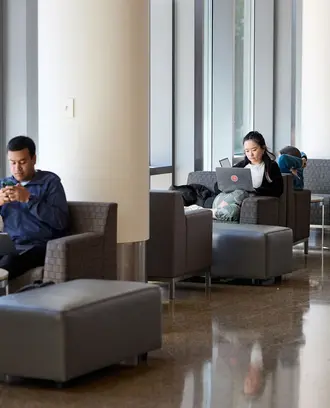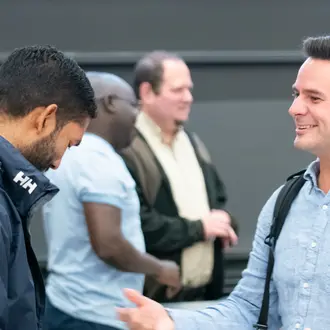Costantino Sambuy, SF ’06
“I shrug when people lament these changing times. When, in the last 2,000 years, haven’t we been living in changing times?” laughs Costantino Sambuy, SF ’06, CEO of Peugeot Motocycles, the world’s oldest manufacturer of scooters. In his deceptively bucolic French hamlet near the Swiss and German borders, Sambuy has been riding a turbulent industry, a turbulence only supercharged by the global pandemic. What was once a purely mechanical industry is now one heavily focused on software and electronics. “Motorcycles used to be mechanical machines, now they are sophisticated computers on wheels,” Sambuy says. Accordingly, managers who rose up through the ranks as mechanical engineers must rapidly pivot and gain expertise in computer science. Adding to the challenge, electric bicycles are suddenly all the rage in Europe, cutting into Peugeot’s motorbike sales. Sambuy sees these obstacles as creative catalysts and Peugeot Motocycles is meeting them with inventive products, such as the new electric moped eLudix. The sleek “urban e-bike” has taken Europe by storm, even though the pandemic has complicated the company’s strategic plan. Getting the myriad parts of the moped through a highly disrupted global supply chain has made it difficult for the company to keep on the right side of supply and demand.
Supply chain traffic jam
In addition to supply chain gridlock, the pandemic has changed the way people buy products—and the way Sambuy’s employees market and sell them. And that will dramatically change the company’s relationship with its employees. “People don’t want to physically go into a showroom anymore,” says Sambuy. “They want to buy everything online, and they want it to be delivered to their doorsteps the moment they realize they want it. We have to rethink the way we sell motorcycles.”
Given that the company makes products that are the result of multiple collaborations and in-factory testing, remote working was not a natural part of the pre-pandemic employee/employer contract at Peugeot Motocycles. From March 17 through May 11, however, the company went 100% virtual when France shut down in response to the COVID-19 epidemic. When the country officially reopened, the company welcomed back half its workforce, allowing hands-on workers to return to the business of developing and producing motorbikes. Those employees who can carry on remotely without loss of productivity are still working from home.
Sambuy says that most of his teams quickly adapted to remote working and have been able to be productive and collaborative in that format. “Remote work is here to stay,” he says. “We are learning how to organize teams so that we can work from home without any loss of creativity or productivity. And workers are happier when they are able to create a better work/life balance. I had lunch with my kids almost every day during quarantine, for example. That’s something I hadn’t done in 20 years. We had an amazing time together. Being able to better manage your home life and your work life makes for happy employees, and happy employees are effective employees.”
Remote but personal, distant but equal
The idea that Peugeot Motocycles would have been a remote operation was unthinkable this time last year. Now, it seems a natural evolution of the workplace. And a consequential one. Among the greatest unexpected benefits, Sambuy says, is how it is bringing all his international colleagues together in a democratic environment. “Everyone is equal on the screen.”
According to Sambuy, the past cultural protocols, restrictions, and hierarchies that were inherent in physical meetings have all but disappeared in the online format. “Everyone is comfortable because they’re on their home turf,” he says. “At the same time, when we’re meeting online, we all have the culture of Zoom in common, bringing us into a rare commonality that transcends our own regional cultures. I find there are fewer cultural misunderstandings.”
Will these changes stick? “The employer/employee contract is being rewritten as we speak,” Sambuy says, “and it will be a better one, a fairer one, a contract in which everyone benefits—including our families.”



